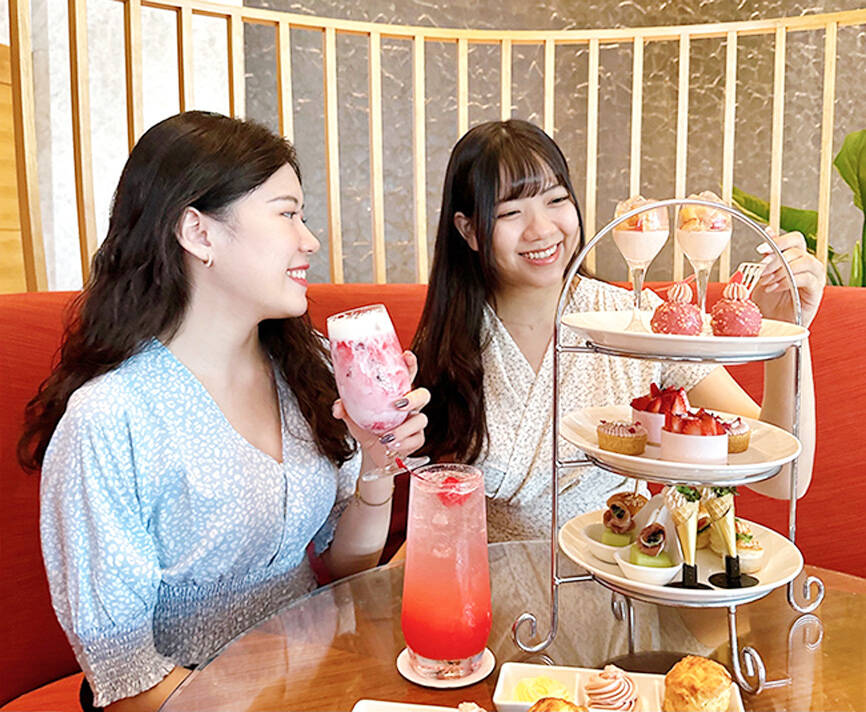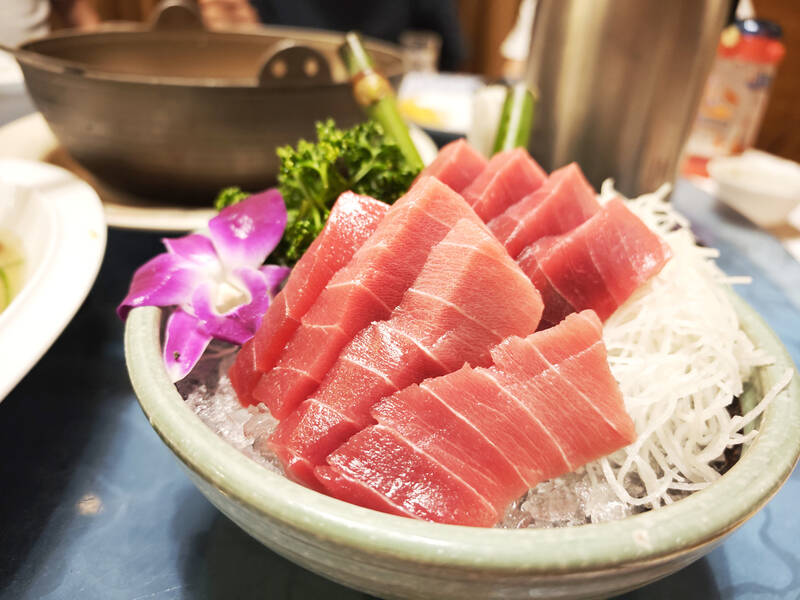Sampling the nation’s gourmet food has become a major focus of domestic travelers, a Tourism Administration survey showed.
The survey of Taiwanese aged 12 or older about their domestic tourism experiences last year showed that “eating gourmet food” has become a popular tourist activity.
Although “gourmet food” ranked third as an important factor when considering a travel destination, it grew the most to 12.2 percent, up from 10.6 percent last year and 7.8 percent prior to the COVID-19 pandemic, the survey showed.

Photo: Wang Chun-chung, Taipei Times
“Convenient transportation” and “relaxation or health promotion” ranked as the two most important considerations at 28.6 percent and 17.6 percent respectively, it showed.
In terms of tourism activities, most respondents, 63.4 percent, chose “natural attractions” among their activities, followed by “other leisure activities” at 50.7 percent and “eating gourmet food” at 50.5 percent, it showed.
However, “eating gourmet food” increased the most among the activities, rising 2 percent, while the others either remained the same or decreased, the data showed.

Photo: Chen Yen-ting, Taipei Times
Of the gourmet food categories, “local specialties or featured foods” remained at the top at 43.9 percent, up from 41.7 percent prior to the pandemic, while having “coffee or tea” rose from 7.1 percent before the pandemic to 10.1 percent last year, marking the strongest growth of 3 percent, it showed.
Meanwhile, 18.3 percent of respondents said “eating gourmet food” was their favorite tourism activity, surpassing the 18.1 percent for “other leisure activities,” although “natural attractions” topped the list at 43.3 percent, the data showed.
On specific activities, most respondents said they preferred “sightseeing” at 22.5 percent, followed by “hiking or camping in the mountains” at 14.1 percent and “local food specialties or featured foods” at 14 percent.
Gourmet foods have become a major consideration for tourists around the world, especially after the COVID-19 pandemic, National Kaohsiung University of Hospitality and Tourism’s Graduate Institute of Tourism Management professor Wayne Liu (劉喜臨) said.
Although most tourist destinations in Taiwan are less attractive due to their lack of distinctiveness and differentiation, local dishes and specialties are enough to attract travelers, such as beef soup in Tainan, Liu said.
As for the popularity of having “coffee or tea” during a trip, one reason is that individual or small group travelers have become more common after the pandemic, and they have more flexibility in their itineraries to focus on personal experiences, he said.
Another reason is Taiwan’s hot weather, which makes many tourists choose a cafe over outdoor activities, as they can rest and have a cup of coffee until late in the afternoon, he said.
Taiwan’s cafes are also thriving, on the back of the positive performance of Taiwanese coffee in international competitions, along with government efforts to renovate aging buildings, Liu said.
That makes running a cafe an attractive option for a young person in the food industry who wants to start their own business, he said.

Taiwanese were praised for their composure after a video filmed by Taiwanese tourists capturing the moment a magnitude 7.5 earthquake struck Japan’s Aomori Prefecture went viral on social media. The video shows a hotel room shaking violently amid Monday’s quake, with objects falling to the ground. Two Taiwanese began filming with their mobile phones, while two others held the sides of a TV to prevent it from falling. When the shaking stopped, the pair calmly took down the TV and laid it flat on a tatami mat, the video shows. The video also captured the group talking about the safety of their companions bathing

US climber Alex Honnold is to attempt to scale Taipei 101 without a rope and harness in a live Netflix special on Jan. 24, the streaming platform announced on Wednesday. Accounting for the time difference, the two-hour broadcast of Honnold’s climb, called Skyscraper Live, is to air on Jan. 23 in the US, Netflix said in a statement. Honnold, 40, was the first person ever to free solo climb the 900m El Capitan rock formation in Yosemite National Park — a feat that was recorded and later made into the 2018 documentary film Free Solo. Netflix previewed Skyscraper Live in October, after videos

Starting on Jan. 1, YouBike riders must have insurance to use the service, and a six-month trial of NT$5 coupons under certain conditions would be implemented to balance bike shortages, a joint statement from transportation departments across Taipei, New Taipei City and Taoyuan announced yesterday. The rental bike system operator said that coupons would be offered to riders to rent bikes from full stations, for riders who take out an electric-assisted bike from a full station, and for riders who return a bike to an empty station. All riders with YouBike accounts are automatically eligible for the program, and each membership account

A classified Pentagon-produced, multiyear assessment — the Overmatch brief — highlighted unreported Chinese capabilities to destroy US military assets and identified US supply chain choke points, painting a disturbing picture of waning US military might, a New York Times editorial published on Monday said. US Secretary of Defense Pete Hegseth’s comments in November last year that “we lose every time” in Pentagon-conducted war games pitting the US against China further highlighted the uncertainty about the US’ capability to intervene in the event of a Chinese invasion of Taiwan. “It shows the Pentagon’s overreliance on expensive, vulnerable weapons as adversaries field cheap, technologically